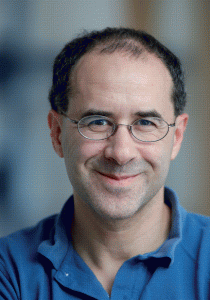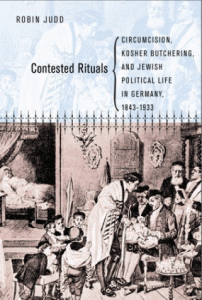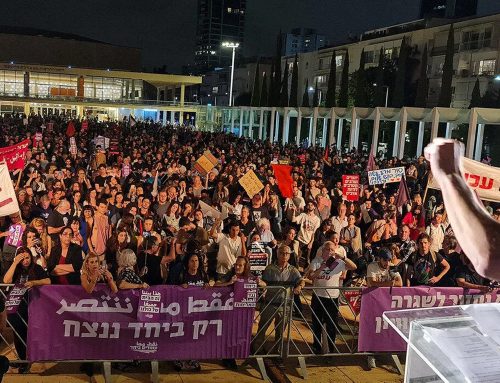
Professor Michael Rosenthal, expert in Spinoza and Jewish philosophy, has organized a panel on circumcision and human rights.
Professor Michael Rosenthal, a Jewish Studies faculty member, is Chair of the Department of Philosophy at the University of Washington. He recently spoke with us about his reasons for organizing a multi-disciplinary panel on circumcision. Click here to find out more about “Circumcision as a Human Rights Issue,” which will take place on the UW campus on March 4th at 7:00 p.m. The event, which is co-sponsored by the Stroum Jewish Studies Program and the Walter Chapin Simpson Center for the Humanities at UW, features experts in history, philosophy, and anthropology exploring past and present aspects of the circumcision debate.
Q. Was there an issue in the news recently that motivated you to organize the March 4th panel, “Circumcision as a Human Rights Issue”?
A. I was shocked to read in the papers last summer that a court in Cologne, Germany had ruled that circumcising young boys represents grievous bodily harm and that the practice should be criminalized. Although the case involved a young Muslim boy, it had obvious repercussions for Jews there as well. (There are more than 4 million Muslims in Germany and almost 100,000 Jews.) The decision unleashed a torrent of debate, which pitted the rights of parents to bring their children up in a religion against the child’s right to “bodily integrity,” which was the basis of the court’s decision. Six months later the German Parliament passed a law that effectively overturned the court’s decision and ensured that parents have the right to circumcise their boys. I found it remarkable that in Germany of all places there could be such a complete lack of respect for Muslims and Jews. But the more I looked into it, even though circumcision is more common here than in Europe, I discovered that there were many controversies in the US as well. In 2011 a group in San Francisco collected enough signatures to put a measure on the municipal ballot that would ban all circumcisions in the city. In 2012 the Board of Health in New York City required that parents sign a consent form for the traditional religious practice of metzizah b’peh, wherein the circumciser uses his mouth to remove blood from the incision. Even Jews disagree amongst themselves about circumcision.
Q. How are the discourse and debates about circumcision different in the US versus Europe?
A. Circumcision of male children is far more common in the US than in Europe. Right now about 80 percent of American men are circumcised as compared to about 10% in Europe. (The rates there vary. In the UK it is between 10-15%, while in Denmark, only 1.6% of male children are circumcised.) However, the rate of circumcision is dropping quite dramatically in the US. Two thirds of boys born in hospitals were circumcised in the ’80s and ’90s, but in the last ten years the rate has dropped to around fifty percent. At the same time, the World Health Organization has advocated male circumcision as a proven method to slow the spread of HIV infections. It has adopted policies to promote male circumcision in Africa for this purpose, at the same time as it has worked to limit the practice of female genital cutting in the continent.
Q. Why has circumcision recently become a human rights issue?
A. It is not unusual to frame discussion of important moral issues these days in terms of basic human rights. It is not just in Germany that a concern for “bodily integrity” or “liberty of religion” is defined in terms of a person’s rights. In countries like ours, where rights are the basis of constitutional protections, the moral issue becomes inextricably entwined with legal issues. The abstract discussion of rights can quickly become a political issue as laws are proposed to protect one right or another. This is illustrated in much of the discussion around female genital cutting (sometimes called “female circumcision”; see panelist Bettina Shell Duncan‘s 2007 book, Transcultural Bodies, for extensive analysis of this topic). Those who find these practices abhorrent have worked hard to condemn them as violations of the woman’s rights and then used laws to ban the practice.
The whole issue is further complicated by the fact that the debate has become medicalized. In the US, male circumcision became prevalent after the Second World War in large part because it became framed not as a religious ritual but as a hygienic practice. I was fascinated to read in panelist Robin Judd’s book, Contested Rituals, that these debates began back in the 19th century among Jews in Germany, as some Jews challenged the role of mohels (ritual circumcisers) and argued that it should become a medical practice controlled by doctors. The problem of female genital cutting is equally complicated. There has been a debate among medical professionals whether the practice, if it can’t be stopped, shouldn’t be medicalized, so that it could limit the possible dangers in traditional procedures done outside a hospital.

Prof. Robin Judd, who will speak at the March 3rd panel, addressed circumcision in her book “Contested Rituals” (Cornell University Press).
Q. What light can philosophy shed on the circumcision discussion? Are there terms or constructive concepts that your field adds to the discourse?
A. There are at least two ways in which philosophy can inform this debate. Sometimes we think that the law is enough to determine the rightness or wrongness of something. But if we disagree with the law or if there isn’t a law that prohibits a particular practice, then we need some reason to explain our judgment. If we judge something as morally right or wrong, it is important to know on what basis we make that judgment. It is not enough to stipulate something as wrong but we also need to explain why it is so. The systematic study of ethics helps explain and deepen our understanding of our moral judgments. It helps us deal with conflicts in basic moral intuitions. Likewise, when we talk about “rights,” we need to know what they are, whether they apply universally, and how best to defend them. At the same time, philosophy needs to be informed by knowledge of actual practices and the history of those practices. That is why, for this panel, I have asked an anthropologist and a historian to join in our discussion.
Q. What do you hope audience members will gain from the upcoming discussion on March 4th?
A. Circumcision touches on some of our most basic beliefs. For many Jews and Muslims it is the sign of a covenant with God. For others it is a cruel and barbaric practice that damages the bodies of children without their consent. I hope that our panel can help inform people about the various debates and also serve as an occasion to hear the different views and consider them with respect. We can’t cover all possible positions, but I hope to get a good discussion going.







[…] a link to a brief interview Rosenthal did for the UW Jewish Studies website to publicize the event: https://jewishstudies.washington.edu/blog/why-is-circumcision-human-rights-issue/. Share this:TwitterFacebookLike this:Like Loading… This entry was posted in Events by […]